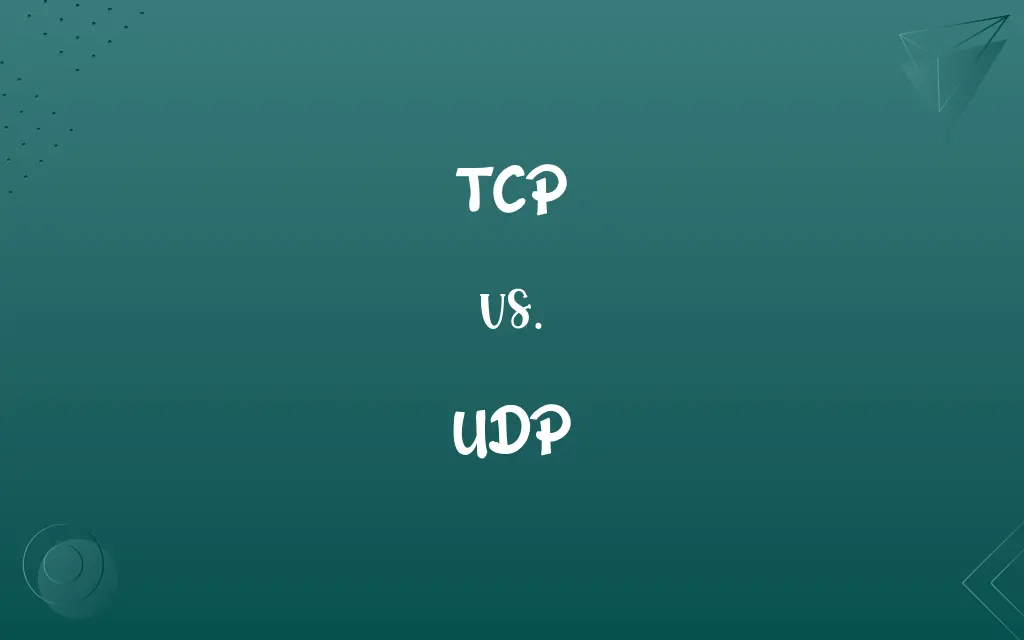TCP vs. UDP: Know the Difference

By Shumaila Saeed || Updated on December 25, 2023
TCP (Transmission Control Protocol) is a connection-oriented protocol that ensures reliable data transmission, while UDP (User Datagram Protocol) is a connectionless protocol that allows faster, but less reliable, data exchange.

Key Differences
Transmission Control Protocol (TCP) is designed for reliable communication, establishing a connection between the sender and receiver before data transfer. User Datagram Protocol (UDP) does not create such connections, which allows it to transmit data more quickly, though with the potential for packets to be lost or received out of order.
Shumaila Saeed
Nov 20, 2023
TCP provides error checking and guarantees the order of data packets, ensuring that messages are delivered as sent. Conversely, UDP performs no such checks, resulting in a lower overhead and, thus, higher potential throughput, but with the risk of errors and unordered packets.
Shumaila Saeed
Nov 20, 2023
TCP is analogous to a phone call with acknowledgment of receipt, making it suitable for applications like web browsing where reliability is key. UDP is like sending a letter without confirmation, used in scenarios like live broadcasts where speed is more critical than precision.
Shumaila Saeed
Nov 20, 2023
TCP's flow control moderates data transfer to prevent overwhelming the receiver, while UDP allows senders to flood recipients with packets, which is ideal for real-time applications that can tolerate some loss, such as online gaming or video conferencing.
Shumaila Saeed
Nov 20, 2023
In TCP, packet loss triggers retransmission, ensuring data integrity at the cost of latency. UDP, lacking such mechanisms, is better suited for applications where latency is a greater concern than packet loss, such as VoIP (Voice over IP) services.
Shumaila Saeed
Nov 20, 2023
ADVERTISEMENT
Comparison Chart
Use Case
Web browsing, emails, file transfers
Streaming, online gaming, live broadcasts
Shumaila Saeed
Nov 20, 2023
ADVERTISEMENT
TCP and UDP Definitions
TCP
TCP provides error-checking mechanisms for data transfer.
TCP's error correction is essential for file downloads to prevent corruption.
Shumaila Saeed
Nov 10, 2023
UDP
UDP does not confirm the receipt of data packets.
UDP's lack of acknowledgment allows for quicker voice packet delivery in VoIP calls.
Shumaila Saeed
Nov 10, 2023
TCP
TCP includes flow control to manage data packet delivery rates.
TCP's flow control prevented the server from being overwhelmed by the client's requests.
Shumaila Saeed
Nov 10, 2023
UDP
UDP enables faster data transmission at the expense of reliability.
The gaming server used UDP to ensure real-time responsiveness.
Shumaila Saeed
Nov 10, 2023
TCP
TCP is a protocol that ensures all data packets arrive at their destination.
Websites often use TCP to make sure that all page content loads correctly.
Shumaila Saeed
Nov 10, 2023
ADVERTISEMENT
UDP
UDP is a protocol that sends data without establishing a connection.
UDP is used for broadcasting live sports events due to its low latency.
Shumaila Saeed
Nov 10, 2023
TCP
TCP is used where data integrity is more critical than speed.
Online banking transactions use TCP for secure and accurate data transfer.
Shumaila Saeed
Nov 10, 2023
UDP
UDP is used for broadcasting messages over a network.
The streaming service utilized UDP to efficiently send video to multiple subscribers.
Shumaila Saeed
Nov 10, 2023
TCP
TCP coordinates packet transmission for reliable communication.
TCP retransmitted the lost packets to deliver the complete message.
Shumaila Saeed
Nov 10, 2023
UDP
UDP is suitable for applications where speed trumps data integrity.
UDP facilitated the fast exchange of messages in the chat application.
Shumaila Saeed
Nov 10, 2023
TCP
A protocol developed for the internet to get data from one network device to another;
TCP uses a retransmission strategy to insure that data will not be lost in transmission
Shumaila Saeed
Nov 09, 2023
Repeatedly Asked Queries
What is TCP?
TCP is a reliable, connection-oriented protocol used for secure data transmission.
Shumaila Saeed
Nov 20, 2023
What is UDP?
UDP is a connectionless protocol that allows for rapid data transfer with less overhead.
Shumaila Saeed
Nov 20, 2023
Are TCP connections stateful?
Yes, TCP maintains the state of the connection through its control mechanisms.
Shumaila Saeed
Nov 20, 2023
Is UDP faster than TCP?
Yes, UDP is generally faster than TCP because it has less overhead.
Shumaila Saeed
Nov 20, 2023
Why is TCP considered reliable?
TCP is reliable because it confirms packet delivery and corrects errors.
Shumaila Saeed
Nov 20, 2023
Does TCP use handshaking?
Yes, TCP uses a three-way handshake to establish a connection.
Shumaila Saeed
Nov 20, 2023
Does TCP control flow and congestion?
Yes, TCP has mechanisms for flow control and congestion avoidance.
Shumaila Saeed
Nov 20, 2023
Can UDP be used for video streaming?
Yes, UDP is often used for streaming video due to its low latency.
Shumaila Saeed
Nov 20, 2023
Is TCP suitable for real-time applications?
TCP is less suitable for real-time applications compared to UDP due to its focus on reliability.
Shumaila Saeed
Nov 20, 2023
How does TCP ensure data reliability?
TCP uses acknowledgments, retransmissions, and sequence numbers to ensure packets are received correctly.
Shumaila Saeed
Nov 20, 2023
Does UDP guarantee packet order?
No, UDP does not ensure that packets arrive in order.
Shumaila Saeed
Nov 20, 2023
Can TCP be used for live broadcasts?
TCP is generally not preferred for live broadcasts due to latency introduced by its reliability features.
Shumaila Saeed
Nov 20, 2023
Can UDP handle multicast?
Yes, UDP can support multicast, sending data to multiple recipients simultaneously.
Shumaila Saeed
Nov 20, 2023
What is a TCP segment?
A TCP segment is a packet of data encapsulated with a TCP header that contains control information.
Shumaila Saeed
Nov 20, 2023
What applications use TCP?
Applications like web browsers, email, and file transfers typically use TCP.
Shumaila Saeed
Nov 20, 2023
How does TCP handle lost packets?
TCP retransmits lost packets until they are correctly received.
Shumaila Saeed
Nov 20, 2023
What does connectionless mean for UDP?
Connectionless means UDP does not establish a session before sending packets.
Shumaila Saeed
Nov 20, 2023
What type of applications prefer UDP?
Real-time applications, such as online games or VoIP, prefer UDP.
Shumaila Saeed
Nov 20, 2023
Is UDP good for high-latency networks?
UDP can be better for high-latency networks where timely delivery is more important than reliability.
Shumaila Saeed
Nov 20, 2023
What is a UDP datagram?
A UDP datagram is a packet of data sent over UDP without sequential checks or acknowledgments.
Shumaila Saeed
Nov 20, 2023
Share this page
Link for your blog / website
HTML
Link to share via messenger
About Author
Written by
Shumaila SaeedShumaila Saeed, an expert content creator with 6 years of experience, specializes in distilling complex topics into easily digestible comparisons, shining a light on the nuances that both inform and educate readers with clarity and accuracy.









































































